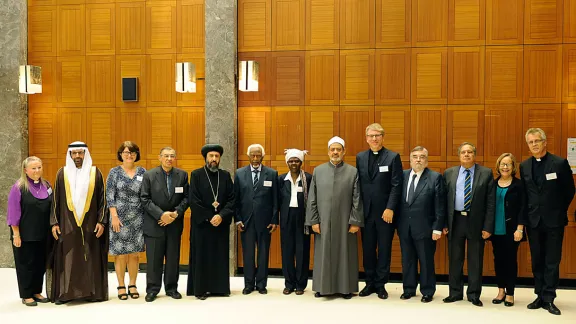
âOur being together here is an expression of the fact we are unanimous in our resolve not to be derailed from the message of peace,â Junge told the gathering, which included the Muslim Council of Elders led by the Grand Imam of Al-Azhar, and representatives of the World Council of Churches, its member churches and ecumenical partners including the LWF.
“Our role is to stand up against attitudes that counter peace”
Peace is at the heart of God’s vision for all humanity, the general secretary of The Lutheran World Federation (LWF), Rev. Dr Martin Junge, said at a high-level dialogue meeting between Muslims and Christians on the theme “Towards an integrated world” this weekend.
“I think our being together here is an expression of the fact that we are unanimous in our resolve not to be derailed from the message of peace,” Junge told the gathering, which included the Muslim Council of Elders led by the Grand Imam of Al-Azhar, based in Cairo, and representatives of the World Council of Churches, its member churches and ecumenical partners including the LWF.
“I believe we understand our role today, which is to prophetically stand up against messages, attitudes and actions that counter God’s intentions of peace for the entire humanity,” added Junge.
The meeting focused on the vital role of religious communities in peace-building, and the relationship between poverty and violence caused by religion, as well as the importance of religious literacy in combatting extremism.
Called to peace
Junge noted that both Muslim and Christian sacred texts call believers to peaceful lives, even as human beings carry the potential for violence.
“We are capable of the most beautiful expressions of art and beauty, of love and care, and yet also capable of the most abhorrent violence, hatred and oppression. This ambivalence characterizes Christians, Muslims, Jews, Buddhists, Hindus, Zoroastrians… not because of their religious affiliation, but because of their human condition.”
In order to remain witnesses for peace in a fragmented world, Junge urged faith groups to remain in dialogue with one another, educate their constituencies about the dangers of extremism and identify passages in their sacred texts that are used to justify violence.
With regards to these texts, Junge added, “We won’t be able to fight religious extremism without giving tools to our leaders to relate and interpret those texts in our respective scriptures.”
We are capable of the most beautiful expressions of art and beauty, of love and care, and yet also capable of the most abhorrent violence, hatred and oppression.
Joint service is strong witness
Junge urged more joint collaboration between Muslims and Christians to serve the needy in the world. Reflecting on the LWF’s work together with Muslims in Jordan, Kenya and Nepal, he maintained “that joint service… carries the weight of 10 statements one could issue.”
He added that Muslims and Christians had a duty to “protect human beings in volatile contexts, particularly where they are at risk of becoming prey to sectarian violence of any kind, including religiously motivated.”
He also emphasized the need to empower Muslim and Christian youth, adding that the best way to do this was for their parents, leaders and elders to live in peace and harmony. “Youth is not the problem today. Leadership is the problem today, and what youth learn from it.”
Extremism and violence among youth are rooted in poverty and marginalization; extremism seems to offer more hope than the political, social and economic systems, Junge said. “Young people need to have a perspective for their lives, so as to love their lives and the lives of others. A teaching of youth that doesn’t come with empowerment of youth, will go only half way.”


